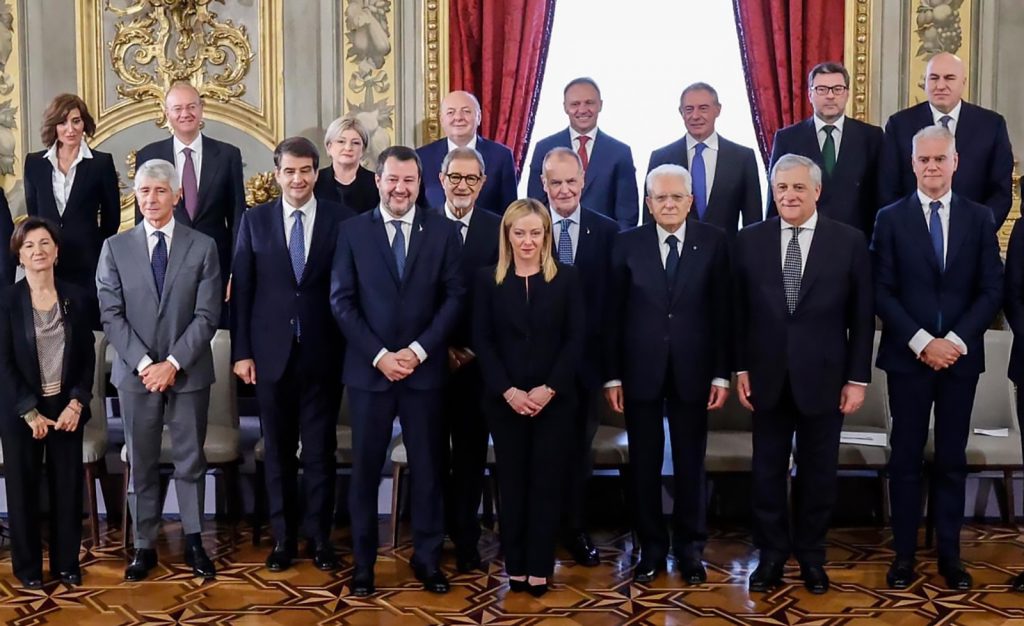On 21 October 2022, Giorgia Meloni became the first female Italian Prime Minister. She heads up the most right-wing government in the history of the Republic. Massimo D’Angelo explores the implications for Italy’s foreign policy and European outlook, as well as the lure of authoritarianism in some European governments
Giorgia Meloni is the new Italian Prime Minister. She is the first woman to hold that office since the birth of the Italian republic in 1948. More importantly, observers consider this government to be the most right-wing in the history of the Republic. Meloni, Minister of Youth in Berlusconi's fourth government (2008–2013), founded her party, Fratelli d’Italia (Brothers of Italy), in 2012.
The Brothers have, until now, spent the entire decade of their existence in opposition – and this has helped propel its rise in the polls. In the 2022 general election, the Brothers gained 26% of the votes, making it the largest party in parliament. A right-wing coalition consisting of the Brothers, the League and Forza Italia emerged victorious.
Meloni’s agenda has changed over time, but in the past, she has backed strong anti-immigrant, anti-EU, and anti-establishment positions
Meloni’s agenda has changed over time, but she has previously backed strong anti-immigrant, anti-EU, and anti-establishment positions. The tricolour-flame symbol of her movement comes from the Italian Social Movement (MSI), active from 1945 to 1995. MSI was a neo-fascist party founded by former members of the banned National Fascist Party (1921–1943) and the Republican Fascist Party (1943–1945). Brothers of Italy members have often been accused of clinging to nostalgia for a fascist past.

It is only more recently that Meloni, on the back of rising popularity, realised that to have any prospect of becoming a successful Prime Minister she needed to align with pro-Atlantic positions. Since the Russian aggression in Ukraine she has vigorously endorsed the European alliance, reaffirming Italy’s Atlanticism. This was also made possible by the party's strong proximity to the armed forces. One of Meloni's personal allies (and the newly elected President of the Senate), Ignazio La Russa, was Minister of Defence during one of Silvio Berlusconi's governments. La Russa is a politician who has never openly condemned the fascist experience.
In the past, Meloni has repeatedly proposed leaving the Eurozone. Today ‘Italexit’ has disappeared from her agenda
In the past, Meloni has repeatedly proposed leaving the Eurozone. Today ‘Italexit’ has disappeared from her agenda, and she has made a commitment to supporting respect for European rules.
Yet, it is difficult to evaluate how sincere or permanent these changes are, and what agenda Meloni will pursue now she is in power. She has formed alliances with strong Eurosceptic parties. In September 2020, she was elected President of the European Parliament's European Conservatives group, allying her with the Polish PiS, Spanish Vox, and the Sweden Democrats. In September 2019, Meloni's Brothers of Italy invited Hungarian President Viktor Orbán to its party conference in Rome. Here, he openly attacked the European Union.
A large anti-EU bloc led by Italy now seems a possibility, after a period in which so-called ‘sovereignism’ seemed to be losing its strength. Even if the goal is no longer disintegration of the EU, an emptying out of its powers could be on the agenda. Further integration seems difficult to achieve. Moreover, the success of Meloni's government could spill over into other European countries. This is what Meloni declared during a recent speech in Spain, in which she voiced hope for a victory of the Spanish nationalist party, Vox.
The ruling coalition consists of three political forces. All appear fascinated by foreign authoritarian models, although there is no unanimity on which of them to pursue. Lega leader Matteo Salvini, and Silvio Berlusconi, leader of Forza Italia, have always enjoyed good personal, political and economic relations with Russia. Indeed, these two parties have often argued against sanctions on Russia. Salvini said he feels more at home in Moscow than in Brussels, and Berlusconi has always called Putin a friend.
Giorgia Meloni appears much closer to the Polish model. Her fidelity to NATO is not in doubt, but Euroscepticism has been a mainstay of her foreign policy.
It is unlikely that Meloni will realign her government toward mainstream conservative values; those represented by the more traditional European conservative parties such as the German Christian Democrats, the French Republicans or the Spanish People’s Party.
In view of Italy's difficult economic conditions, Meloni may be forced to come to terms with the EU. However, she cannot risk disappointing her core voters
Yet, in view of Italy’s difficult economic conditions, she may well be forced to come to terms with the EU. For this reason, Meloni has made great efforts to reassure Brussels. However, she cannot disappoint her electoral base too much either.
One easy – but risky – temptation could be for Meloni to provoke identity-based battles on the basis of her firm positions on the family and abortion. Unsurprisingly, one of the first legislative bills mooted would hinder the voluntary interruption of pregnancy.
Italy's new government may find it electorally useful to polarise the country around such issues. It might help divert attention from an economic policy that will have to be largely in line with Brussels' requirements.